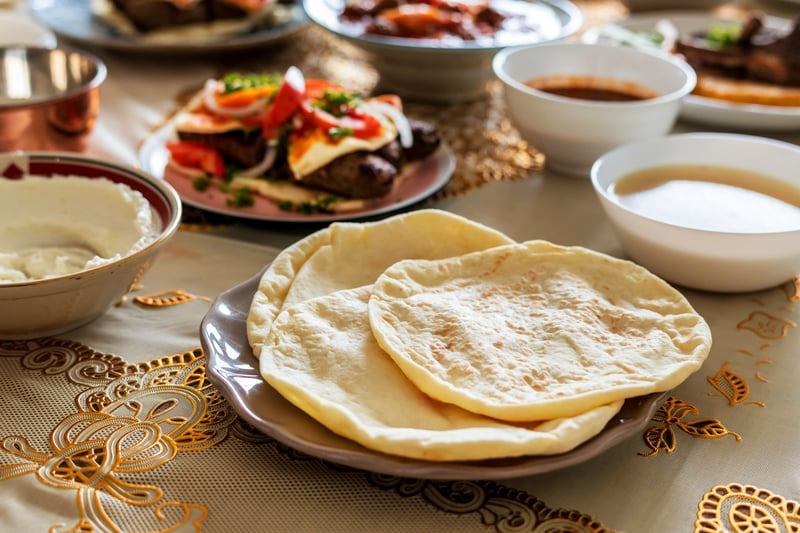Halal food essentially refers to any and all food and beverage items that Muslims are permissible to consume under the Islamic dietary guidelines.
The concept and consumption of halal food is overall a very important part of the modern Muslim culture, which subsequently translates to the substantially rising demand of halal food products globally.
In this guide, we not only break down what is halal food, but also it’s associated intricacies by answering:
- What is the concept behind halal food?
- How to know which food is halal?
- What food is considered halal?
- Can Muslims eat food without knowing how it was prepared?
Also Read: Halal Certification Requirements for Food
The Concept and Meaning Behind Halal Food
Before we dive into the roots of what halal food is, it is important to understand what the term “halal” itself means. Halal is an Arabic word that means “lawful or permitted.” Although halal encompasses all products and life choices, it’s widely-associated with food and drink.
Therefore, halal food, like every other aspect of halal, is inspired by the Quran, and the core guiding principle behind it is that Muslims should only consume food that is good for them and avoid those that are unhealthy/impure.
Hence, halal food must go through a specific process from farm to packaging or plate to be truly considered halal. For this reason, food labeled halal must undergo halal certification so consumers can have the utmost confidence it is what it claims to be.
What is Haram (Non-Halal) Food?
Food that isn’t deemed halal is considered haram (“forbidden”) and shouldn’t be consumed by halal adherents. The preparation of halal food is considered sacred, and is also part of the criteria for halal-certified food.
For example, if halal meat is prepared using utensils that have touched haram meat, it is no longer considered halal. Similarly, if a vegetarian dish is prepared in a pan that used cooking wine (or other forms of alcohol) for a prior meal, the dish is now haram.
How to Know Which Food is Halal?

In supermarkets or specialty stores, pre-packaged halal food will include a certified halal sticker or symbol.
For instance, if a particular food truck or restaurant promotes their establishment(s) as halal-compliant and have separate prep areas, cooking utensils, and plates for their food, as well as an established halal food and supplies vendor, then they can serve halal-certified food.
The scope of permissible halal food is wider than many assume, and most plant-based food falls into accordance with halal. Many popular food items are available for halal followers. However, it’s important to note all ingredients in a dish, as some food additives (such as gelatin and lard) may not considered halal.
Read More: The (Detailed) Halal Certification Process
Are Halal Food Standards Flexible?
Some believe halal food has a little room for interpretation. At times, restaurants will adopt the word as interchangeable with Middle Eastern cuisine, although the two don’t always overlap.
Different Muslim sects may interpret more specific instructions when it comes to halal food. Nonetheless, the fundamentals of halal persist, and by following these fundamentals, food becomes easier to categorize.
Moreover, Halal and the Jewish kosher diet are easily confused by non-Muslims and non-Jews (and even by some Muslims and Jews), but halal stands as its own, unique dietary practice and tradition.
Read More: The Differences and Similarities in Halal & Kosher Certifications
What Kind of Food is Considered Halal?

Halal food is any food that isn’t forbidden by the Quran. Chapter 2 of the Quran states in verse 168, “Eat of what is lawful and wholesome on the earth.” Broadly speaking, we say halal foods are those foods that are life-giving
Halal food ranges from fruit to meat to desserts. Any food which is hygienic and free of alcohol, harmful (or toxic) ingredients, intoxicants, and pork products, and any meat which has undergone halal slaughter and preparation may be considered halal.
Below are some of the most common food staples that are generally halal:
✔️ Fresh Fruit & Vegetables
Fresh fruit and vegetables are always halal food — unless they’ve been sprayed with non-halal chemicals or injected with haram preservatives.
Halal adherents can enjoy, among other plant-based food, common organic fruits such as apples, blueberries, and strawberries.
✔️ Grains, Dairy Products & Nuts
Grain dishes, sans haram ingredients, are also great halal options. Food like pasta, rice, and bread can be halal food. Cheese and dairy products must be made from halal microbial enzymes or bacterial cultures, including the rennet or gelatin that may be used in the process.
Legumes and nuts are also typically included in halal food diets. Desserts and soups without alcohol or other haram products are also halal food.
✔️ Meat & Poultry
Halal meat must go through a halal-certified slaughter and preparation process, known as dhabihah (or zabiha). Meat from non-halal slaughterhouses is never considered halal food.
Thus, even meat allowed by halal regulations, such as cow, poultry, and sheep, isn’t halal unless it’s procured through halal slaughter.
Meat that died of natural causes (for example, a deer that dies on its own in the woods) and meat killed by a hunter’s arrow or gunshot isn’t halal. Swine and exotic meats such as alligator and rattlesnake are not halal food, either.
Check Out: Halal Certification for Meat & Poultry
✔️ Seafood
Seafood, including shrimp, is enjoyed by many who follow a halal lifestyle. Seafood doesn’t require the same slaughter practices as halal meat.
In fact, pescatarians looking for halal-friendly dishes can enjoy most seafood and freshwater fish.
Read More: Is Seafood Halal? Benefits of Halal Seafood Certification
✔️ Beverages
There are also a vast number of drinks that can be halal-certified, but again, all ingredients (even the most miniscule) are an important component.
In a broad sense, most carbonated beverages, fruit juices, teas, coffee, almond milk, soy milk, and milk from cows or goats are permissible. However, if a haram ingredient is added to these drinks, they’re no longer halal.
Check Out: Halal Certification for Beverages
Can Muslims Eat Food Without Knowing if it’s Halal?
Muslims cannot eat food before confirming that it is halal food. It’s vital that Muslims are intentional about what they eat. Even if food seems like it may be halal, scanning the ingredients of a product or searching for a halal-certified symbol can verify whether or not food is halal.
In the U.S., specialty food stores and Middle Eastern grocers are great places to purchase halal food. There are many online stores that sell halal food as well.
You can also find halal food options at national grocery chains like Whole Foods and Costco. Halal food is available worldwide, and offers many delectable, nourishing options for all consumers.
When shopping or at a restaurant, your surest bet is to look for a halal certification icon such as our green “H”.

What is Halal Certification?
Halal certification is a process that ensures products and services meet Islamic law standards, making them permissible for Muslims to use and consume.
This certification provides assurance that the food, cosmetics, pharmaceuticals, and other goods have been produced, processed, and prepared according to strict halal guidelines.
Frequently Asked Questions (FAQs)
1. How do I know if a food product is Halal?
To ensure a food product is Halal, look for a Halal certification symbol on the packaging. This symbol indicates that the product has been reviewed and approved by a recognized Halal certification body, confirming that it meets all necessary Halal requirements.
2. What foods are considered Halal?
Most plant-based foods, grains, dairy products, fruits, and vegetables are considered Halal as long as they are not contaminated with haram (forbidden) substances. Meat and poultry are also Halal if they are slaughtered according to Islamic guidelines, known as dhabihah or zabiha.
3. Are all meats Halal?
Not all meats are Halal. For meat to be considered Halal, it must come from an animal that is permissible to eat (e.g., cow, chicken, sheep) and must be slaughtered in a specific manner outlined in Islamic law. The animal must be healthy at the time of slaughter, and the name of Allah must be invoked during the process.
4. What is the difference between Halal and Haram food?
Halal food is permissible for Muslims to eat according to Islamic law, while Haram food is forbidden. Haram foods include pork, alcohol, and any meat that is not slaughtered according to Islamic guidelines. Additionally, food that is contaminated with non-Halal substances or prepared using non-Halal utensils is also considered Haram.
5. Can Muslims eat non-Halal food if they are unsure of its status?
Muslims are advised to avoid food that they are unsure about. It is important to verify whether the food is Halal by checking for a Halal certification or consulting with a knowledgeable source. Consuming food that is known to be Haram is strictly prohibited in Islam.
Written Mohammad Hussaini (Vice President AHF), Reviewed by Mohammad Mazhar Hussaini (Renowned author Islamic Dietary Concepts & Practices, President AHF).
Sources:

Backed by more than 60+ years of combined experience in global halal standards and practices, the Halal Foundation Editorial Team is dedicated to delivering insightful, accurate, and practical content that empowers businesses and consumers to navigate the halal landscape.




